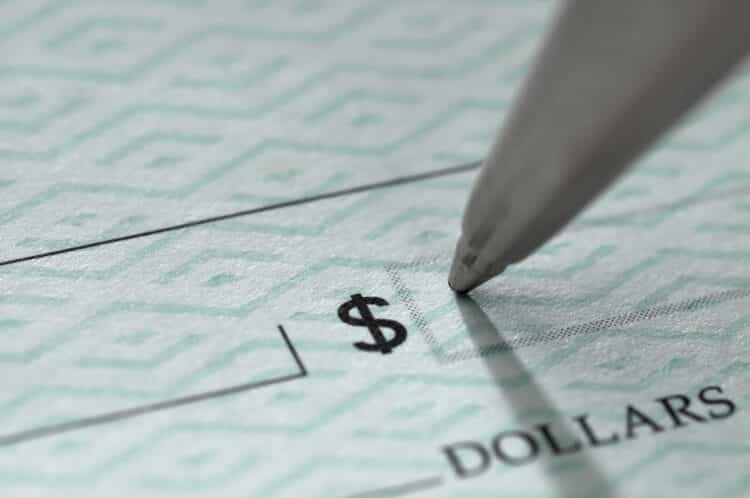It happens more often than not. Your kiddo has a birthday coming up, Grandma wants to spoil them, and they get a check for $100 in the mail.
The money is nice, but your eight-year-old doesn’t have a bank account. They certainly don’t have a public job. What can you do as the parent or guardian to ensure that Grandma’s money gets spent as intended?
You’ll need to know how to deposit or cash that check, even though your child might not even know enough cursive to sign their name.
Cashing checks made out to children isn’t a straightforward process. Each bank, credit union, and financial institution has different policies and procedures to follow. Since the rules differ, you’ll need to know what to expect from your institution’s processes.
How to Deposit Checks Made Out to Children
Checks made out to children can be deposited by their parents or guardians when the following steps are completed. First, print the child’s name and add a hyphen after that says “minor.” Print the adult’s name on the line beneath, sign the document, and add the account number to where it should be deposited.
Children don’t have the option to cash gift checks. Even older teens can have trouble depositing a paper check from a part-time job. As the parent or guardian, your role is to help them get the money into their savings account or into a purse or wallet.
Each institution has different rules to consider when a check is made out to a minor. Here are the considerations to review so that you can have a positive experience.
Can I Deposit Checks Made to My Children?
Generally, banks and credit unions allow a designated parent or guardian to cash or deposit checks made out to children. Most institutions require you to have an account to process the funds, but there are some exceptions.
It could be required for you to have a shared account with your child. In this example, both of your names would be associated with it. This option is called a “custodial” account.
Each person in a custodial account is allowed to make a deposit or request a withdrawal. There might be limits to how much money a minor can request from their accounts at some banks and credit unions.
How Can I Endorse a Check Made Out to My Child?
The first step should always be to contact your financial institution to find out what the rules are for endorsing checks made out to kids.
With some credit unions, it might not require an endorsement if you have a joint custodial account or an independent account in the child’s name.
If you plan to put the money into your account, you’ll typically need to sign the back of the check with the child’s name and your own. The designation “minor” should be present with the paperwork.
It might be necessary to include your account number on the check when signing it on behalf of a child. After your signature, you might need to write the word “parent’ to ensure the designation is accurate.
What If My Child’s Name is Misspelled on the Check?
Does your child have a name like Geoffery Brayeden Johannssoon? If so, there’s a good chance that Grandma might have missed a couple of letters when writing out the check.
If Grandpa wrote the check, it might just say something like “Jeff J.”
When the misspelling is enough to create confusion about who should receive the funds, your bank or credit union might require proof of identification to process the check.
That means you might need to bring a state-issued product, a passport, or a birth certificate to ensure the Know Your Customer rules are followed appropriately.
Policies can be different with each institution, so it helps to call ahead to ensure you know what to expect with this issue.
Can I Put My Child’s Check into My Account?
Some financial institutions require a child’s check to be deposited into their account or one with a joint custodial account.
Others allow parents or guardians to deposit a child’s check into a family account.
If your child doesn’t have an account in their name, a parent can typically deposit funds made out to a minor into one of theirs. You’ll need to follow whatever rules are present for endorsing the check, including your child’s signature.
It’s usually a good idea to bring identification with you to the bank or credit union to ensure the institution understands who can legally receive the funds.
This transaction might need to happen in person at a local branch so that an employee can verify the documents.
Instead of putting the money into your account, consider opening a joint custodial one with your child. When kids start learning about how to handle money early, it helps them have a better understanding of what to expect with their finances as they get older. You want to have a strong foundation of money wisdom to ensure their choices in this area work to avoid debt.
Even if your kids are in middle school or younger, it is never too late to start talking about the pros and cons of having a savings account at a local bank.
Why Won’t the Bank or Credit Union Cash My Child’s Check?
Although we are moving closer to a cashless society, we have not reached that point yet. Debit cards, electronic payments, and instant transfers are all great options, but more than 3.7 billion paper checks get written each year.
The combined value of those written checks in 2020 was more than $7.87 trillion.
Grandma can write checks all day long to all the grandchildren without much effort. Trying to cash it becomes a bit of a headache.
If you try to cash a check with your child and the bank or credit union refuses, there are four primary reasons why you could be running into a problem.
- No Identification. You typically need a government-issued identification document for your child and yourself to cash a check successfully. Some hospitals send birth certificates home that look like legal documents, but they don’t offer help to prevent check fraud.
- Too Much Money. Grandma can be generous, but that means the check might need to clear before you receive any money. Some institutions can require between seven to ten business days to have enough funds available when cashing out a significant amount.
- No Account. Banks and credit unions aren’t obligated by law to cash checks if you or your child don’t have an account at the institution. If you go to cash the check at the same place where the writer holds an account, you might get your money if there’s enough in the account to cover the request.
- Too Old. Some checks say that they are void after a particular amount of time. The most common options are between 60 to 180 days. If the day goes beyond the deadline, the amount cannot be honored because the funds have become “stale.”
The Federal Reserve treats old checks with deadlines as a guideline for cashing, but some financial institutions keep to a solid line in the sand. They stay conservative to avoid taking a financial loss.
Legally, banks can refuse to cash checks that are six months old. Some institutions will still do it if you’ve been a long-time customer or if it’s for a child, but that is at their discretion.
If an old check was written for one institution, but the account migrated to a different bank because of an acquisition or merger, it might not be honored. The routing or account numbers often change during this transition.
What If My Child Receives a Post-Dated Check?
Grandma wanted to make sure that her grandchild got $100 on their birthday. The mail arrived early, so now your child has the check, but the date on it is still four days away.
A post-dated check is still cashable. If a bank refuses to provide funds, it could be following the instructions given by the issuer.
When someone provides advanced written notice to your bank to not cash a post-dated check, it remains a valid request for up to six months. Asking for this benefit in person cuts the time down to two weeks.
Banks have an obligation to follow these rules strictly and completely.
Can I Make Mobile Deposits with Checks Made Out to Children?
Most financial institutions offer a mobile app to simplify the deposit process. Your child would need to fill out the back of the check according to the bank’s instructions to ensure the funds get deposited as expected.
Parents will snap photos of the front and back of the check. After reviewing the details of the order, you can finalize the request.
Someone from the bank will review the pictures to ensure the information is accurate. Once approved, the funds might not be available until a clearing period expires.
A Final Thought on Depositing Checks Made Out to Minors
It is lots of fun to get a check made out to a child because it offers opportunities for kids to learn about banks and savings accounts. When simple money management concepts are learned at an early age, it is easier to help them understand the differences between wants and needs.
I always counted my money compulsively when I was young. My parents used the envelope method of saving with me, which meant I had to split my cash into different categories. One was for “toys and games,” another was for “snacks,” and there was the one for “charity” that helped me to learn to think about others.
Those envelopes would fill with cash because I didn’t get to go to different stores much while growing up. My family would take a trip to the city about twice per month, and I’d get to go about half the time.
And yeah – I moved more cash out of the charity envelope to the one for toys and games than I’d care to admit.
What I appreciated the most was how my parents were willing to be involved with my learning process. They taught me the value that money offers, how to get it when it’s needed, and why it doesn’t always buy happiness.
I learned the difference between “want” and “need” quickly. Whenever I’d get a check, they’d sit with me to help me understand how to budget those funds appropriately.
It is possible to have parents deposit checks when they’re made out to minors in their direct family. Always check with your institution’s rules to ensure you don’t invalidate the check or need to take extra steps to put the money into the appropriate account.


